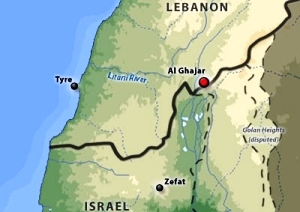
Residents of Ghajar, a village straddling the Israeli-Lebanese border, are angered over the prospect of the community being split after Prime Minister Benjamin Netanyahu agreed to turn over the northern half of the town to Lebanon.
Succumbing to pressure from Lebanon and the United States, Netanyahu is expected to inform United Nations Secretary General Ban Ki-Moon of the withdrawal during a meeting in New York on Monday. Israel was required to pull out of northern Ghajar as part of the UN Security Council resolution that ended the 2006 war between Israel and Hezbollah.
“I oppose this decision,” Nasser Moustafa, a resident of Ghajar, told The Media Line. “People here are completely dependent on Israel. Lebanon has no means of taking care of us: no electricity, no medical services. It would be as though you dropped us in the middle of a desert.”
A village of 2,200 residents, Ghajar took on symbolic importance for Hezbollah and many other Lebanese as one of the last vestiges of Israel’s occupation of southern Lebanon. The US has pressured Israel to turn over the sector as a way of shoring up the mainly pro-Western government of Lebanese Prime Minister Sa’ad Hariri.
Together with the Golan Heights, the southern half of Ghajar was taken by Israel in the 1967 Six Day War with Syria. After Israel annexed the Golan in 1981, Ghajar fell under official Israeli jurisdiction and most of its residents have accepted Israeli citizenship.
Over the years, the village expanded northwards into Israeli-controlled southern Lebanon, incorporating the Lebanese village of Wazzani. The UN demarcated the Israeli-Lebanese border following Israel’s withdrawal from southern Lebanon in 2000, granting Lebanon control of the northern section of Ghajar. However, Israel re-took the entire village following its war with Hezbollah in 2006.
Moustafa added that talk of partition has been circulating in the village for over a decade, but people have grown skeptical of the rumors. Despite never having visited Syria, Moustafa, although almost 40 years old, said he felt more Syrian than Lebanese.
“We have brothers in Syria,” he said. “In the past, we used to serve in the Syrian army, not the Lebanese army. How can one suggest we live in Lebanon with Hezbollah and all the other militias?”
In fact, Ghajar isn’t quite inside Israel either. The village is surrounded by a fence, preventing both Lebanese and Israelis from freely entering or leaving. But once inside, no barrier separates the Israeli side of the Ghajar from the Lebanese side. Residents carry a special Israeli entry permit that allows them access through an Israeli checkpoint at the entrance to the village, but residents of the Lebanese side complain it is difficult to receive services from Israel. In 2005, Hezbollah fighters launched a rocket attack on the village, but were repelled by Israeli forces.
Most residents of Ghajar belong to the Alawi sect, an offshoot of Shia Islam, whose adherents include Syrian President Bashar al-Assad and the Syrian political elite.
Najeeb Khateeb, a spokesman for Ghajar, said his townsmen would have consented to the village being transferred in its entirety to Lebanon as a temporary measure before its ultimate return to Syria. He said he opposed the partition.
“We have no objection that the entire village, with all of its lands, be transferred to Lebanon,” he told The Media Line. “However, we refuse to become landless refugees in Lebanon. We remained here to guard our homes and land, even though 50% of our residents were uprooted in 1967 and now live in Syria. We would rather die here than become refugees.”
In fact, Ghajar isn’t quite inside Israel either. The village is surrounded by a fence, preventing both Lebanese and Israelis from freely entering or leaving. But once inside, no barrier separates the Israeli side of the Ghajar from the Lebanese side. Residents carry a special Israeli entry permit that allows them access through an Israeli checkpoint at the entrance to the village, but residents of the Lebanese side complain it is difficult to receive services from Israel. In 2005, Hezbollah fighters launched a rocket attack on the village, but were repelled by Israeli forces.
Khateeb added that the Israeli government’s partition decision was taken without consulting the village residents. “They want to put a Berlin Wall in the middle of the town, separating father from son and brother from brother,” he said. “It’s like the judgment of Solomon.”
An unidentified officer at the Israeli checkpoint leading into the village told The Media Line that no instructions on redeployment had been given. But Netanyahu will probably bring the withdrawal decision to his cabinet after he returns from a trip to the US next week. Arab News

Leave a Reply
You must be logged in to post a comment.